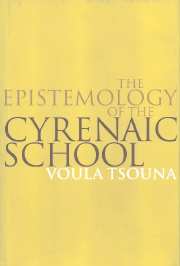Book contents
- Frontmatter
- Contents
- Preface
- Abbreviations
- 1 Knowledge and the good life: the ethical motivation of the Cyrenaic views on knowledge
- PART I SUBJECTIVISM
- PART II SCEPTICISM
- PART III SUBJECTIVISM, EMPIRICISM, RELATIVISM: CYRENAICS, EPICUREANS, PROTAGOREANS
- 9 Cyrenaic subjectivism and the Epicurean doctrine that all perceptions are true: Plutarch, Adv.Col. 1120f–1121e
- 10 Cyrenaic epistemology and Protagorean relativism: some considerations
- 11 The Socratic connection
- Appendix: Sources and testimonies
- References
- Index of names
- Index locorum
- Subject index
10 - Cyrenaic epistemology and Protagorean relativism: some considerations
Published online by Cambridge University Press: 22 September 2009
- Frontmatter
- Contents
- Preface
- Abbreviations
- 1 Knowledge and the good life: the ethical motivation of the Cyrenaic views on knowledge
- PART I SUBJECTIVISM
- PART II SCEPTICISM
- PART III SUBJECTIVISM, EMPIRICISM, RELATIVISM: CYRENAICS, EPICUREANS, PROTAGOREANS
- 9 Cyrenaic subjectivism and the Epicurean doctrine that all perceptions are true: Plutarch, Adv.Col. 1120f–1121e
- 10 Cyrenaic epistemology and Protagorean relativism: some considerations
- 11 The Socratic connection
- Appendix: Sources and testimonies
- References
- Index of names
- Index locorum
- Subject index
Summary
The next parallel, between the epistemology of the Cyrenaic school and Protagorean relativism, was attempted both in ancient and then in modern times. However, there is little evidence as to how precisely the relation between the two theories should be determined.
Cicero clearly considers that there are differences between the two schools since he reports that they have different positions concerning the criterion of truth.
One criterion is that of Protagoras, who holds that what appears to a person is true for that person, another is that of the Cyrenaics, who believe that there is no criterion whatsoever except the inmost feelings, another is that of Epicurus, who places the whole criterion in the senses and in the primary notions of things and in pleasure. On the other hand, Plato believed that the whole criterion of truth and truth itself lies merely in reasoning and in the mind, detached from belief and from the senses.
(Cicero, Luc. 142 [T4c])A similar statement is made by Eusebius.
Aside from the philosophers that were set forth by us, in this gymnastic contest the stadium will also contain, stripped of all truth, those from the opposite side who took up arms against all the dogmatic philosophers put together (I mean the school of Pyrrho), and who declared that nothing amongst men is apprehensible, and also the school of Aristippus who maintain that only the pathē are apprehensible, and again the schools of Metrodorus and Protagoras, who hold that we must trust only the sensations of the body.
(Eusebius xiv.2.4–7 [T8])- Type
- Chapter
- Information
- The Epistemology of the Cyrenaic School , pp. 124 - 137Publisher: Cambridge University PressPrint publication year: 1998



